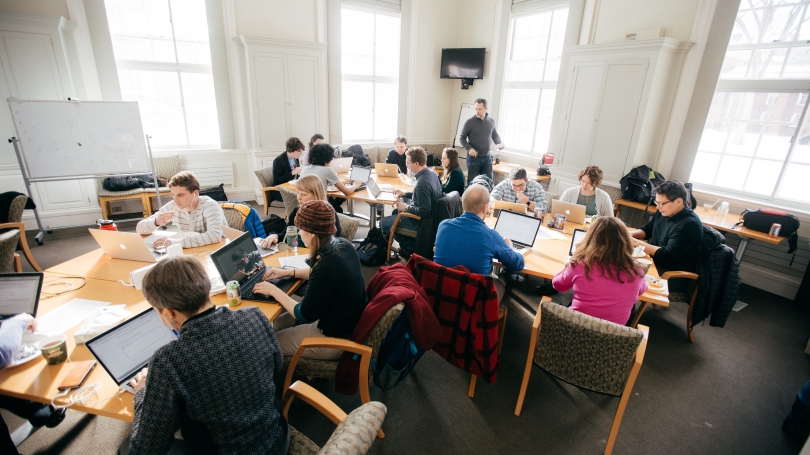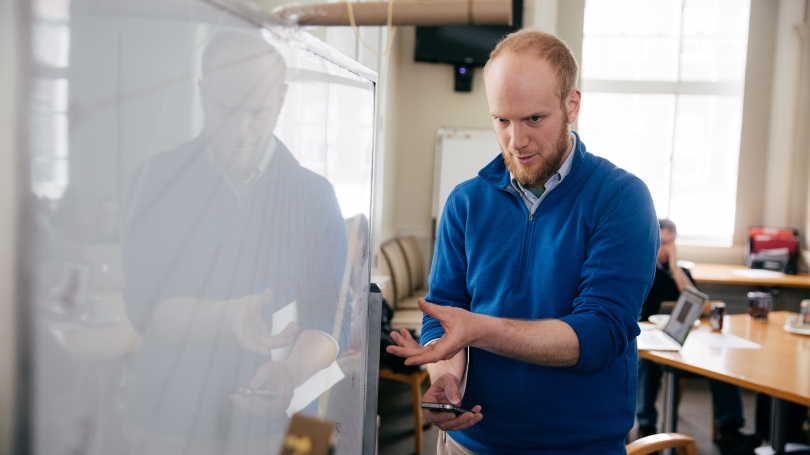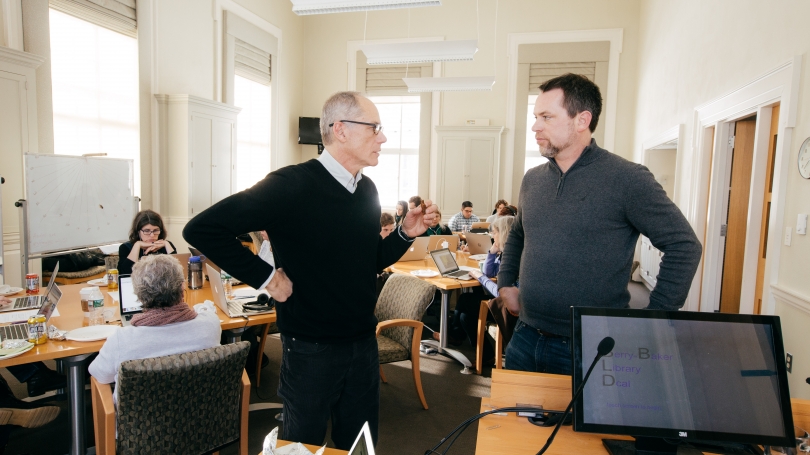DartmouthX: Bringing Seminars to Scale

These two course delivery models, occurring in tandem, have become the norm for colleges since the inception of edX, an online learning platform and consortium founded by Harvard and MIT in 2012. Dartmouth joined edX and formed DartmouthX in 2014, and since then has produced five massive open online courses (MOOCs) through the platform and reached 75,000 learners.
And while these two course delivery models seem to diverge quite dramatically—one in person and one at a distance, one an intimate group and another a virtual crowd—both are imbued with the key characteristics that make them authentically Dartmouth. Both models emphasize person-to-person learning, creating and applying knowledge within a community of peers, and working alongside the world’s leading scholar-educators in their fields.
So just what sets these models apart, and why pursue both?
According to Josh Kim, Director of Digital Learning, developing and teaching MOOCs through DartmouthX has a direct and positive impact on Dartmouth’s residential courses.
“MOOCs provide a testing ground for teaching innovation,” he says. “They are an amazing opportunity for educational R&D.”
Indeed, a 2014 Columbia University study identified similar motivations and perceptions among the 62 peer institutions it surveyed. Of the six most common reasons to offer a MOOC, institutions named the opportunities to conduct educational research and explore innovation in teaching and learning as two.
The appeal for faculty to teach a MOOC through DartmouthX, Kim explains, is more specific.
“Faculty who teach MOOCs have the chance to try new things, redesign course materials, and develop new capabilities,” he says.
Since all DartmouthX faculty also teach residential courses, these capabilities and resources get funneled back to their campus classrooms.

From the faculty perspective, teaching a MOOC offers a chance to expand one’s reach and gain new insights from teaching a different population than they might normally encounter among Dartmouth undergraduates.
According to Dartmouth Professor of Physics, Astronomy, and Natural Philsophy Marcelo Gleiser, “Teaching an entire career at a university like Dartmouth, you’re only going to reach a fraction of the number of people you reach teaching a single DartmouthX course.”
MOOCs enroll global audiences of thousands of learners ranging in age from nine to 99. Working with such a large and diverse student population enables faculty to deepen their understanding of the learning experience, and to broaden their perspectives and influence in their fields.
Despite these advantages, the notion of a course enrolling thousands of students poses something of a threat to the traditional, seminar-style model of teaching and learning. This is especially true at institutions like Dartmouth, where a sense of community and the relationships enabled by a small teacher-student ratio are prized. Massive online courses simply can’t compete in this regard, but proponents of the online model suggest that all is not lost of the intimate, relational learning experience.
To maintain these qualities and ensure a rich learning experience, even at this scale, Dartmouth’s MOOC faculty work closely with course teams comprised of Instructional Designers, Media Educators, Librarians, and undergraduate Teaching Assistants. This team-based teaching approach enables a smooth transition of residential course material into the digital space and simply puts more brains on the task of creating a high-quality experience for learners. With a range of areas of expertise, from cognitive science to app development, these teaching teams employ specific tools to bring the seminar feel to the digital classroom.

One example of this is the use of a collaborative digital annotation tool called Lacuna Stories in last year’s DartmouthX course, The American Renaissance: Literature of the 19th Century. The tool, developed by Stanford’s Poetic Media Lab, is most often used to enhance discussions of course readings in small seminar-style classes. Using the tool, students and professors interact with course readings in a digital interface where they can add highlights, takes notes, pose questions, and enter keywords. Users can choose to make their annotations public so that others in the class can view and interact with them. This collaborative reading approach serves to extend conversations before and after class sessions and prepare students more effectively for in-person discussions.
DartmouthX’s use of Lacuna Stories was its debut in a MOOC settings. In seeking to replicate that rich, person-to-person learning experience within a community of peers, the MOOC course team hypothesized that Lacuna Stories might have the same effect on learning in both environments.
“We recognize that, like all learners, MOOC learners interact and participate in a course in a variety of ways,” says Mike Goudzwaard, Lead Instructional Designer for the American Renaissance course team. “Some learn best from course videos, and others are very active on the discussion boards. Lacuna Stories provided another mode for learners to engage with the content.”
When asked whether the tool offered comparable benefits in the MOOC setting as in the smaller seminar class, Goudzwaard confirmed the team’s hypothesis.
“The collaborative annotation that took place in the course was prolific,” he says. “We were surprised to see that it continued long after the course had officially ended.”
These tools, and the teaching teams that deploy them, are two of the valuable artifacts emerging from the MOOC experience at Dartmouth. Technologies that have been effective in the MOOC classroom are proving useful for faculty teaching on campus as well, and teaching as part of a collaborative course team is a model that is now being replicated in the residential classroom.
While the small seminar table and the massive digital classroom occupy different educational worlds, their paths continue to converge in the pursuit of teaching excellence at Dartmouth.
This post first appeared on the website of the Dartmouth Center for the Advancement of Learning.